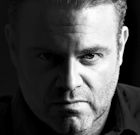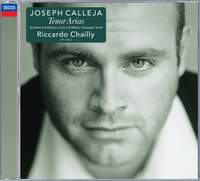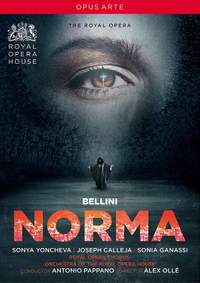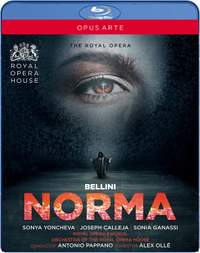Interview,
Joseph Calleja on Verdi
 Now two decades into a stellar international career, the Maltese tenor Joseph Calleja initially made his name in lyric Verdi roles such as Alfredo in La Traviata, Macduff in Macbeth and the Duke in Rigoletto; his stunning recent album (which was one of our Recordings of the Week last Friday) sees him dipping a toe into heavier repertoire which may figure in his future, including snapshots of Manrico (Il trovatore), Radamès (Aida), Alvaro (La forza del destino) and the title-roles in Don Carlo and Otello.
Now two decades into a stellar international career, the Maltese tenor Joseph Calleja initially made his name in lyric Verdi roles such as Alfredo in La Traviata, Macduff in Macbeth and the Duke in Rigoletto; his stunning recent album (which was one of our Recordings of the Week last Friday) sees him dipping a toe into heavier repertoire which may figure in his future, including snapshots of Manrico (Il trovatore), Radamès (Aida), Alvaro (La forza del destino) and the title-roles in Don Carlo and Otello.
I spoke with Joseph earlier this week about his long-term game-plan for taking on these new roles on stage, the special challenges of Verdi’s writing for tenor, and the voices of the past which have inspired him throughout his career.
You made your professional debut in Verdi: how significant a role has his music played in your career to date?
Yes, Macduff was my first professional engagement at the age of 19, then Rigoletto was my debut at both Covent Garden and the Metropolitan Opera, and Traviata in Chicago, so indeed it has played a major role in my career. My debut album for Decca in 2003 also featured mostly Verdi.
You’re coming back to the role of Macduff in April: how does it feel 20 years on?
It’s not really a taxing role if you cheat! And what I mean by ‘cheat’ is not singing the concertatos [ie passages where the soloist sings with the chorus] that Verdi wrote: they’re treacherous because they’re all in the passaggio, so you have to be very careful not to go flat or sharp, as well as producing a beautiful sort of mezza voce. I remember when I did it with James Levine at the Met (I think it was in 2006), he told me ‘You’re too present – just mark!’. That was the word he used, but what I did was to use voce mista [mixed voice] because that’s what Verdi wanted: it has to be a slow burn of shock when they discover the king’s body. And then of course you have that aria [‘Ah, la paterna mano’], which you have to ace: it’s your only shot in the whole opera, so you really have to nail it! But overall I can relax in this role, just a little - and if I have a great baritone opposite me as Macbeth it’s such a pleasure to see his portrayal. If I were a baritone, Macbeth would be my favourite role!
You’re still singing a lot of bel canto repertoire (particularly Pollione in Norma, which you’ve done in London and New York quite recently): does that feed into your approach to singing Verdi, or do you have to put yourself in a different vocal space?
I have a slightly different approach, and perhaps these days mine is an unorthodox one: I don’t pigeon-hole, just as the great tenors of the past never did. If you look at [Beniamino] Gigli, he sang almost everything: bel canto, heavy Verdi, heavy Puccini, the lot. He just did it at a very slow pace. And what is extraordinary (and I don’t want to sound like I’m giving myself a pat on the back here!) is that even though I just turned forty a couple of days ago and this is my twenty-first professional year, I’ve never experienced major vocal problems. Of course I’ve had ups and downs like everybody else, but I haven’t suffered high-profile cancellations, vocal surgery or imposed rest; a bit of luck always helps, but I’ve always been extremely careful not to push the voice beyond its limits. I’d rather approach everything as bel canto – all that means, after all, is ‘beautiful singing’ - but of course if a role calls for a bit more grip, more bite in the voice then I try to do that as well. Take Mario Del Monaco: when people mention him they usually have late Del Monaco in their heads, because he mainly recorded in the latter part of his career. In his prime, of course he had these moments of what I call sheer vocal testosterone, but he also had such incredible mastery of the mezza voce and the azione vocale.
The new album focuses exclusively on roles which you haven’t yet performed on stage: is this a turning-point which will mean moving away from the more purely lyric roles which you’ve sung up until now?
I won’t be moving away from the lyric roles, but the plan is to slowly (and I mean extremely slowly!) add meatier ones like Don Carlo, Manrico and Radamès – those will come, within the next seven years. And then of course there’s Otello…I think the voice will slowly develop towards that, but for now I just wanted to have excerpts of the role so that in ten years I can compare and see how the voice has evolved (as indeed many other tenors have done in the past). So it’s a calling-card to some extent, and in ten or twelve years’ time if my health allows me (I’m still relatively young and healthy and I plan to carry on being careful with the voice, but life plays tricks!) then we’ll see where the voice has taken me…
Verdi himself wrote in one of his letters that the tenor for Trovatore and Traviata and Rigoletto should be more or less the same: Radamès too, at a stretch. The earliest I will do any of these roles (Radamès, Don Carlo and Manrico) is within five years, which will take me to 45…That way, there’s still time to develop into them and learn them very meticulously and carefully, so that when I do eventually put them on stage everything will be just right.
I spoke with Angela Gheorghiu before Christmas about the work you’ve done together recently on this recording (and on her own album Eternamente), and she was very emphatic about resisting any alteration in the colour and weight of her voice as time marches on...Is that sort of vocal change something you resist or embrace?
There have been some changes, yes, and one might as well embrace them! If I think back to when I was 19, there’s been an incredible development in volume (especially on the high notes) and in the roundness of the voice, but the timbre has remained essentially the same. There’s been a real evolution in every other department, though, and I say with some confidence that this evolution will continue. I’m really into wine, and in a sense it’s like a Saint-Émilion, which gradually comes into its prime between the 25th and the 55th year. With certain vintages, the wine experts agree that you should only start drinking it after 21 years, and then you can enjoy it up until 60, 65 years – even more in some cases! And these changes often make the voice more interesting and virile and suitable for the meatier roles. Having said that, I can still do Bohème, and in fact I did Rigoletto at the Met just seven months ago. It felt so easy, and that’s a good sign, because Rigoletto is really the doctor of the voice: if the voice is not healthy, you will not sing a good Duke!
You mentioned Mario Del Monaco earlier: can I pin you down to a handful of your favourite Verdi tenors on record?
Gosh, it’s difficult: there are so many great Verdians! The two artists that were always gods when it came to the Verdi legato were Carlo Bergonzi and Renato Bruson (if I’m allowed a baritone!), who both had that Verdi line down to a T. Great Verdi singing is really about is legato, cantabile and tonnes of expression – put simply, it’s the ability to float long lines, sustain the breath, and produce beautiful sound. That’s it in a nutshell , but it’s often technically difficult because of his usage of the passaggio. If I had to pick my top three tenors, it would definitely be Luciano Pavarotti, Beniamino Gigli and Carlo Bergonzi; but if I think specifically of Otello, then it’s Del Monaco, Jon Vickers, and Plácido Domingo, who had an incredible mastery of the role.
Joseph Calleja's Verdi album was released on Decca on 2nd February, and includes arias and excerpts from Aida, Don Carlo, La forza del destino, Il trovatore and Otello.
Available Formats: MP3, FLAC, Hi-Res FLAC
Tenor Arias: Verdi, Donizetti, Cilea & Puccini
Joseph Calleja (tenor), Orchestra Sinfonica di Milano Giuseppe Verdi, Riccardo Chailly
'Calleja is a rare discovery, evoking memories from Caruso to Domingo with the suppleness of his tone and the expressive, highly individual lyricism he brings to even the most familiar material.' (The Guardian)
Available Formats: MP3, FLAC
Bellini: Norma (DVD)
Sonya Yoncheva (Norma), Joseph Calleja (Pollione), Sonia Ganassi (Adalgisa);Royal Opera House, Antonio Pappano, Àlex Ollé (director)
'Calleja is in good voice, a generous and graceful singer who generates genuine pathos.' (Gramophone)
Available Format: DVD Video
Bellini: Norma (Blu-ray)
Sonya Yoncheva (Norma), Joseph Calleja (Pollione), Sonia Ganassi (Adalgisa); Royal Opera House, Antonio Pappano, Àlex Ollé (director)
'Calleja is in good voice, a generous and graceful singer who generates genuine pathos.' (Gramophone)
Available Format: Blu-ray






